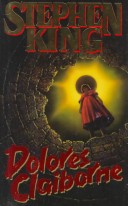Reviewed by jesstheaudiobookworm on
I make a point to read one or two of King’s novels every October. It just seems so fitting. I had Dolores Claiborne on hold for several months leading up to October this year. I listened to a sample of it in the spring and loved the narrator so much that I decided to use it to ring in October 2016.
Dolores Claiborne had several of Stephen King’s hallmark writing traits. The character development, as always, was phenomenal. The character of Dolores felt as real to me as someone I know in real life. The “atmospheric development” (world-building doesn’t feel like the right term) was slightly less involved in this novel than it has been in some of King’s other novels. But again, it’s still miles above what I’m used to reading.
There were three main things that stuck out to me in Dolores Claiborne.
First was the format. Dolores Claiborne was told in the form of an interrogation-style interview given to law enforcement. You only hear Dolores’ side of the conversation but the story is told as if she is giving her formal statement and being recorded. I love stories that are told in unique ways and single point-of-view tales are becoming harder to come by.
The next thing that made Dolores Claiborne stand out to me was the sound effects. I love sound effects. Let me say it again: I love sound effects. I realize that sound effects can detract from the story for certain listeners, but they only enhance it for me. Examples: When the detective entered the room to take Dolores’ statement, a chair was heard sliding across the floor. When Dolores asked for a glass of water during the giving of her statement, liquid was heard being poured into a glass. Those simple sounds served as useful reminders of where and how the story was being told. They pulled me back to the present and kept me mindful of Dolores’ current situation, decades from the story she was telling.
However, I was surprised at how differently this story affected me in comparison with the other King novels I’ve heard. I’m not sure if I’m building up a tolerance or if Dolores Claiborne is just one of his milder tales. It was eerie, for sure, and maybe even a little disturbing. But it was also more humorous than I was anticipating. I lost count of the number of times Dolores made me crack up laughing. She was a downright hoot. Nothing about her story was humorous, mind you, just the way she told it.
She was sharp, sarcastic, indelicate, and tough as nails. More than that, she was real. I swear to you, Dolores felt so real. It’s true that good writing makes characters come alive. I would wager a fair amount of money that Stephen King based Dolores Claiborne on a real person. Either that or he is one imaginative son of a gun.
Narration review: I don’t know where to begin. Frances Sternhagen delivered one of the best performances I’ve ever heard. She brought Dolores to life as much as Stephen King’s writing did. I actually feel bad for anyone who missed out on Sternhagen’s performance by choosing the physical book over the audiobook version of the story. I feel literal pity. I don’t even have words to describe how unbelievable this audiobook experience was. Sternhagen held a thick Maine accent for over nine hours and had me honestly believing that it was genuine (turns out that it wasn’t). The accent added so much to the character of Dolores Claiborne. I’ve never seen Frances Sternhagen on television, in a film, or in a play, but I can tell that she is an absolutely amazing actress just by this performance alone. Nothing I say could do her performance justice, so I’ll just suggest to you listen to the audio sample instead. Give it a listen and I promise not to say “I told you so”. ♣︎
Reading updates
- Started reading
- 1 October, 2016: Finished reading
- 1 October, 2016: Reviewed
